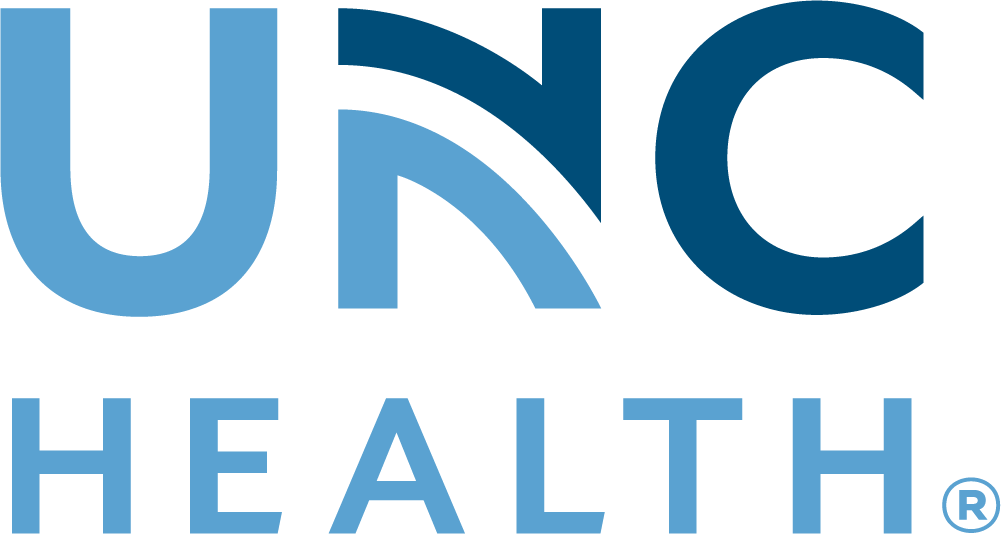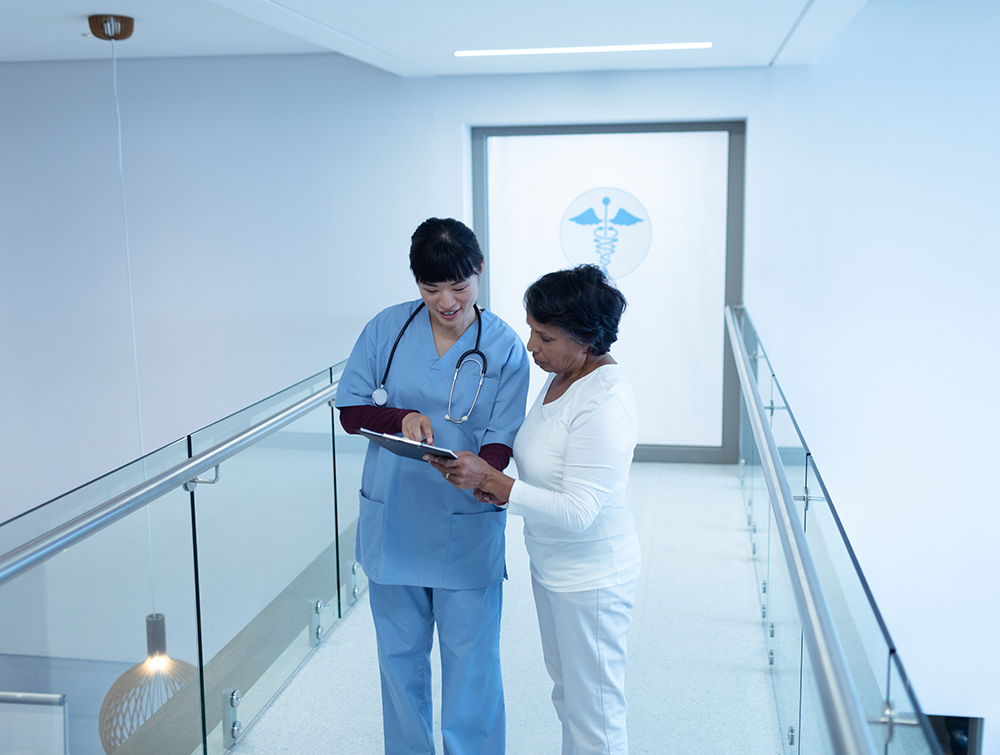What to expect before abdominal surgery
In most cases, your surgeon will perform your abdominal surgery at the main UNC REX Hospital, and you will need to stay in the hospital (inpatient) while you recover. However, your surgeon will let you know beforehand if they expect your abdominal surgery to be an outpatient procedure, meaning that you’ll return home the same day as the surgery.
Preoperative testing
You may need preoperative testing before the day of your surgery. This testing confirms that you are healthy enough to undergo anesthesia (sedation) safely. If your doctor determines that you need preoperative testing, our Scheduling Navigators will make this appointment for you.
Preoperative testing can include drawing blood and imaging or other tests. You will also be evaluated by the Preoperative Assessment Team (PAT) at UNC REX composed of skilled nurses and anesthesiologists. You may also be given two carbohydrate-rich beverages to drink on the day of your bowel prep to optimize blood sugar control.
Preparing for your abdominal surgery at home
You may need a bowel prep to clean out your bowel before abdominal surgery. Our Scheduling Navigators will let you know and provide detailed instructions if you need this. If you already have an ileostomy or a J-pouch, you will most likely not need a bowel prep; we will let you know when we schedule your surgery.
In the days before your abdominal surgery, we recommend stocking up on the following items for your bowel prep and recovery period at home:
- At the pharmacy, pick up the bowel prep kit and any other prescriptions our team may have called in for you, such as antibiotics or anti-nausea medication.
- On the day of your bowel prep, you can drink clear liquids such as sports drinks, juice, tea, broth, Jell-o, popsicles or sodas; see your instruction sheet for more details.
- Pick up personal hygiene supplies such as baby wipes, flushable wipes, pads and zinc oxide barrier creams to protect your delicate perianal skin. These items will be helpful if your bowel function is temporarily altered immediately after surgery.
What to expect on the day of your abdominal surgery
If your doctor recommends you take your daily medications on the morning of your surgery, you can take them with a small sip of water. Otherwise, you should not eat or drink anything before your surgery.
Arrive at the hospital at or before your scheduled registration time. After you complete the registration paperwork, our staff will accompany you back to the preoperative area. There, you will change into a gown, have an IV placed in your arm and meet with your nurses, anesthesia specialist and surgery team.
A member of your care team will take you to the operating room when it is time. We understand that having surgery can be stressful and even overwhelming, but rest assured that everyone here works hard to keep your experience as pleasant and smooth as possible.
After your surgery, a member of your care team will take you to the recovery area, where nurses will closely monitor you and help manage your pain while you come out from under the effects of anesthesia. If your surgeon determines that you can go home the same day of your surgery, your nurses will assist you with discharge instructions and answer any questions you may have. However, if your surgeon determines that you need to stay in the hospital overnight, nurses will help get you to your room on the surgical floor. From there, our surgical nurses will help you begin the recovery process.
What to expect after abdominal surgery
We have provided general instructions here, but each person’s care plan is different. Your surgeon and care team will provide you with details on your specific recovery plan and make additional recommendations before you are discharged from the hospital.
Activity Guidelines
- Walk several times daily to promote good circulation. If you need to stay overnight in a hospital room on the surgical floor, nurses will get you up and walking within four hours of arriving to your room.
- Once you’ve returned home, you can drive a vehicle as long as you are not taking any narcotics (opioid pain medicine) and you feel comfortable doing so. You should never drive if you are taking narcotics.
- You may return to work when you are comfortable with your healing and your pain management. This timeline varies for each patient. If you need a return-to-work note, please call our office or ask for it during your hospital stay.
- Some people benefit from spending time at an acute rehabilitation facility after leaving the hospital. Our physical and occupational therapy teams at UNC REX can help with this decision-making process.
Dietary Recommendations
- Drink plenty of water (six to eight glasses daily) to stay hydrated and keep bowel movements soft, especially if you’re taking opioid pain medications. You can tell if you are properly hydrated if your urine is clear or light yellow. If your urine is dark or tea-colored, you are probably not drinking enough water and should drink more.
- You may eat a regular diet. Recommendations may vary from patient to patient, but some helpful guidelines are provided here.
- Do not drink alcohol within 24 hours of being under anesthesia or if you’re still taking narcotics.
Understanding Bowel Movements
If you have had a bowel resection (surgical removal), your bowel movements may initially be urgent or loose. However, this is temporary. Your bowel habits will become more predictable as your new bowel connection heals. Be patient; a bowel resection can take weeks to months to completely heal.
Especially if you are taking opioid pain medications, follow these tips to avoid constipation after surgery:
- Take a daily fiber supplement, such as Citrucel, Benefiber or Metamucil. Make sure to drink plenty of water with any fiber supplement; otherwise, you can become constipated.
- Take Miralax – a gentle laxative – once or twice daily.
- Take Colace – a stool softener – two to three times daily.
Note that if you have an ileostomy, J-pouch or have had your entire colon removed, the tips above do not apply to you. Instead, you should follow the specific directions that your care team provided at your surgery.
Wound Care Instructions
- If there is clear skin glue on your abdominal incision site(s), you can shower as usual to keep the area clean. Do not try to scrub or remove the glue; it will flake off on its own in two or three weeks. Also, do not use lotion, ointments or creams on your incisions, as these can cause the glue to peel off before the site completely heals.
- If there are staples on your skin, you can shower as usual to keep the area clean. You can keep the staples covered with dry gauze and tape, but you don’t need to. If a nurse does not remove your surgical staples while you are in the hospital, a nurse will remove them at your postoperative visit.
Do not take tub baths until after your postoperative visit. Avoid sitting in bodies of water, such as hot tubs, lakes and oceans. You can shower as usual to keep the surgical area(s) clean.
A small amount of bleeding or bruising is expected and safe. You should call our office immediately if you experience any of the following at the surgical site(s):
- Drainage
- Excessive bleeding
- Separation of the skin
- Warmth or redness
Pain Management Tips
Your surgeon may prescribe one or a combination of the following to help keep you comfortable during your recovery:
- Abdominal binder. If your care team gave you a wide compression belt to wear over your mid-section (abdominal binder) while you were at the hospital, you can wear it as desired for your comfort.
- Acetaminophen (Tylenol). You can take this every four to six hours; do not take more than 4g (4000mg) in a 24-hour period. Do not take this medication if you have liver disease. If you were prescribed an opioid pain medication that contains acetaminophen, be careful to avoid the maximum dose in a 24-hour period. Ask your care team or pharmacist if you have questions about safe dosing.
- Anti-inflammatories or nonsteroidal anti-inflammatory drugs (NSAIDs). You can take an NSAID such as Ibuprofen, Advil or Motrin every four to six hours. Do not take an NSAID if you are on a blood thinner, have kidney disease, have gastric ulcers or have been otherwise recommended not to take it.
- Heating pads and ice packs. You can use these at home to help reduce your pain at the incision site(s).
- Narcotic pain medications (opioids). The surgeon will prescribe narcotics in some cases. If your surgeon determines that you need opioid pain medication, they will prescribe it at the time of your surgery. You should only use these strong, but highly addictive medications for breakthrough pain control after you have taken the non-narcotic pain medication listed above, and it is not working to control your pain.
You should only need opioid pain medication for the first week or so after surgery. After that, use them sparingly as they can cause constipation and addiction. Only your surgeon will prescribe narcotics; on-call providers or after-hours staff cannot refill a prescription, so please plan ahead. See here for more information on our Narcotics Policy.
Follow-Up Care and Appointments
When you are discharged from the hospital, your care team will provide you with the date and time of your postoperative visit (approximately two weeks after your surgery). If you do not receive this information, please call our office to schedule this appointment.
If you experience any of the following, please call our office immediately:
- Bleeding with bowel movements
- Excessive diarrhea
- Fever over 101 degrees F, or a fever that does not come down after you take acetaminophen (Tylenol)
- Inability to urinate (urinary retention)
- Pain that you cannot control with the management tools listed above
- Prolonged nausea or vomiting


